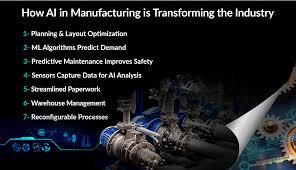The rise of Artificial Intelligence (AI) has been one of the most transformative forces in modern industries. One of the sectors benefiting greatly from AI is manufacturing. AI in manufacturing is reshaping the way products are made, improving efficiency, enhancing quality, and driving innovation across the industry. From predictive maintenance to automated production lines, AI is revolutionizing the manufacturing landscape in ways that were once only imaginable.
What Is AI in Manufacturing?
At its core, AI in manufacturing refers to the integration of advanced technologies such as machine learning (ML), computer vision, robotics, and data analytics to optimize various aspects of the production process. It allows manufacturers to create smarter factories by automating repetitive tasks, improving decision-making, and making operations more efficient and cost-effective.
The application of AI in manufacturing can be found in a variety of areas, including predictive maintenance, supply chain optimization, quality control, and production automation. With the aid of AI, companies can process massive amounts of data in real time, identify patterns, and predict potential issues before they arise, leading to smoother and more streamlined production operations.
Benefits of AI in Manufacturing
- Enhanced Efficiency and Productivity
One of the most significant benefits of AI in manufacturing is its ability to improve operational efficiency. AI-powered machines and robots can work tirelessly 24/7, completing repetitive tasks faster and more accurately than human workers. This leads to shorter production cycles and reduced downtime, increasing overall productivity. AI can also optimize machine performance, ensuring that systems are running at peak efficiency and reducing energy consumption.
- Predictive Maintenance
AI is revolutionizing the way manufacturers approach maintenance. Predictive maintenance, powered by machine learning algorithms, can analyze data from sensors embedded in machinery to predict when a piece of equipment is likely to fail. By addressing issues before they cause a breakdown, manufacturers can prevent costly downtime, reduce repair expenses, and extend the lifespan of their assets. This leads to significant cost savings and more reliable operations.
- Improved Quality Control
AI is also enhancing quality control in manufacturing. With the use of computer vision and image recognition, AI can inspect products for defects at a much higher speed and accuracy than human inspectors. This ensures that only high-quality products make it to the market, reducing the chances of defective goods reaching consumers. AI-driven quality control systems can also learn from past mistakes, continuously improving their inspection capabilities over time.
- Supply Chain Optimization
Managing a manufacturing supply chain can be complex and challenging, but AI makes it more manageable. AI-powered algorithms can forecast demand, track inventory levels in real time, and optimize production schedules. This allows manufacturers to streamline their supply chains, reduce excess inventory, and avoid production delays. By leveraging AI to predict demand fluctuations and optimize logistics, manufacturers can ensure that materials and products are available when needed, without overstocking.
The Challenges of Implementing AI in Manufacturing
While the potential benefits of AI in manufacturing are enormous, the implementation of AI-driven technologies comes with its own set of challenges. One of the main obstacles is the initial investment required to integrate AI into existing systems. The costs associated with acquiring AI software, hardware, and infrastructure can be prohibitive for some companies.
The Future of AI in Manufacturing
Looking ahead, the role of AI in manufacturing will only continue to grow. Advancements in AI technologies, such as deep learning, will enable even more sophisticated systems capable of solving complex manufacturing challenges. As AI becomes more integrated into the industry, smart factories powered by AI will become the norm, creating highly efficient, adaptable, and sustainable manufacturing environments.
In conclusion, AI in manufacturing offers immense potential to revolutionize the industry. By improving productivity, optimizing maintenance, enhancing quality control, and offering greater flexibility, AI is transforming the way products are made. Although challenges exist, the long-term benefits of AI in manufacturing will continue to drive the industry toward more innovative and efficient practices, ensuring that businesses stay competitive in an ever-evolving market.



